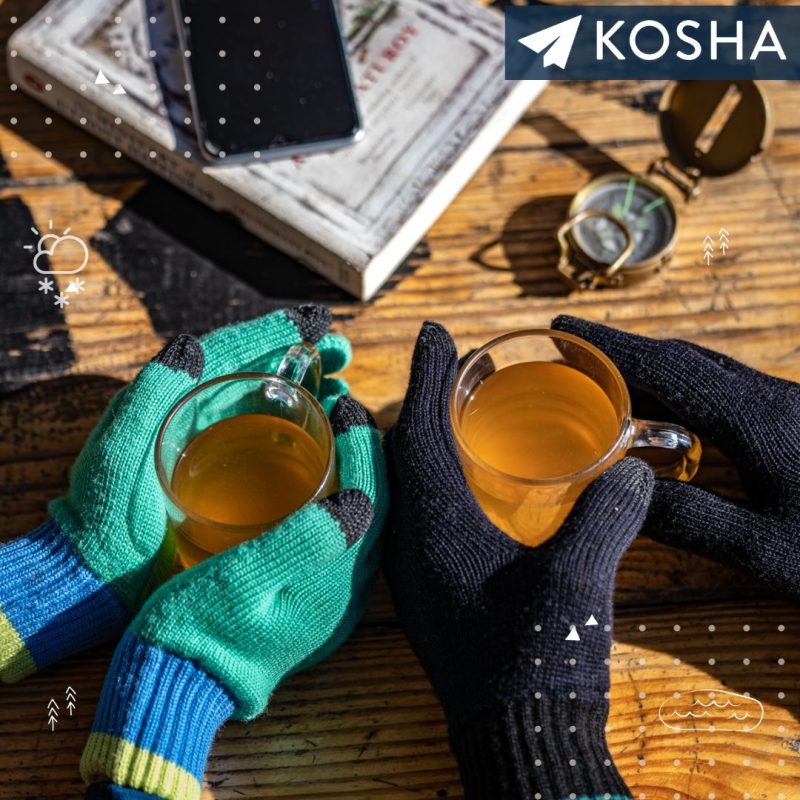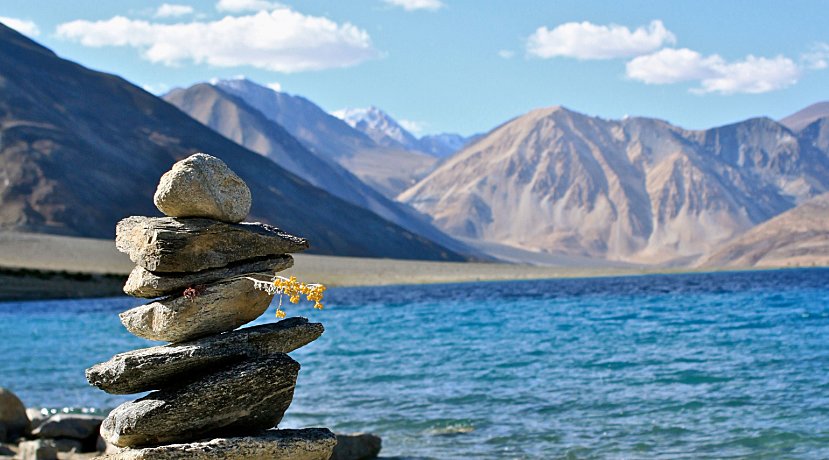
Leh
Leh is the joint capital and largest city of the region administered by India as a union territory. It was also the historical capital of the Kingdom of Ladakh, the seat of which was in Leh palace. It is also a reason why Leh-Ladakh was named together.
Ladakh
Ladakh is an Indian-administered Union territory established on 31 October 2019, bordered by the Tibet Autonomous Region to the east, the Indian state of Himachal Pradesh to the south both the Indian-administered Jammu and Kashmir and Pakistan-administered Giglit-Pakistan.
It is the largest and the second least populous state union territory of India.
What is the Culture in Leh-Ladakh?
Ladakh are the Buddhist monasteries situated far away from the buildings and peoples, these are aesthetically pleasing, highly peaceful, and best for meditation. These monasteries are the place of worship and provide positive vibes to the palace and the visitors. There are numerous national monuments in Ladakh declared as national heritage under the Archaeological Survey of India.

The culture of Leh
Best places to visit in Leh-Ladakh
Pangong Tso Lake: It is a landlocked lake situated at 4350 meters. It is a 12 km lake, extending from India to Tibet. 60% of the lake lies in the Tibetan Autonomous Region. A unique feature of the lake is that it does not remain blue throughout the year or even the day, rather it changes colors from azure to light blue to green and grey too.
Since this lake falls on the Sino-Indian Actual line of control, an inner line permit is required to visit it. The Indian Nationals can easily obtain individual permits, with at least 3 persons in the group, accompanied by accredited guides. The permit needs to be obtained from the office in Leh, for a small fee.
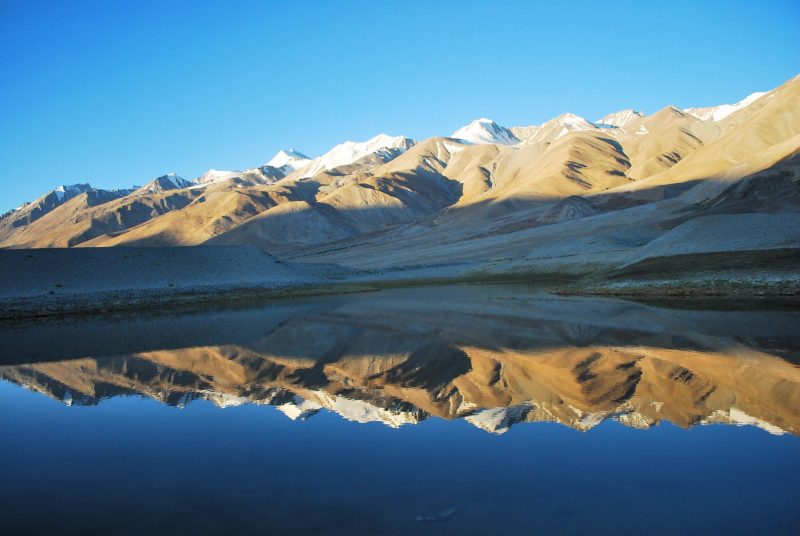
Khardungla Top
Khardungla top: It is one of the world’s most photographed and visited passes because of its altitude Khardungla La Pass, is one of the world’s highest motorable passes.
Khardung La in the district of the Union Territory with a Khardungla pass height of 5,359 meters, can be best visited from May to September. The optimum time to tour the khardungla height. World’s highest mountain pass.
Diskit Gompa: For history lovers, this is an excellent place to visit. The largest and oldest surviving monastery(gompa) founded in the 14th century by Chang Zem Tserab Zangpa means “Crowned Buddha”, in the Nubra Valley near Leh, also known as Diskit Monastery. The Gompa, which stands on a hill above the Shyok River’s Floodplains, enthralls you with its wonderful splendor.
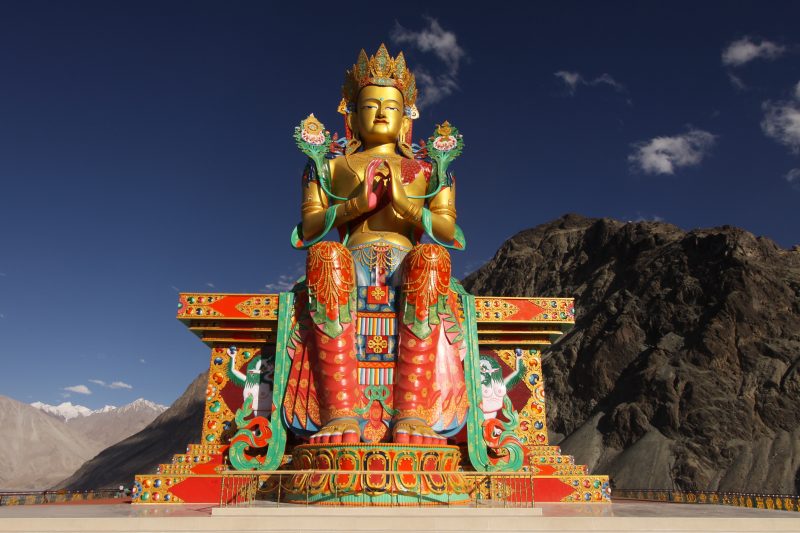
Diskit Gompa of Leh
Magnetic Hill: This hill is a cyclops hill where vehicles defy the force of gravity and move upwards on the hill when parked at the marked location. You can experience this when your vehicle is parked in neutral gear in the yellow box marked a few meters ahead of the Magnetic Hill road. After this point, the car can only move at a speed of 20kmph.
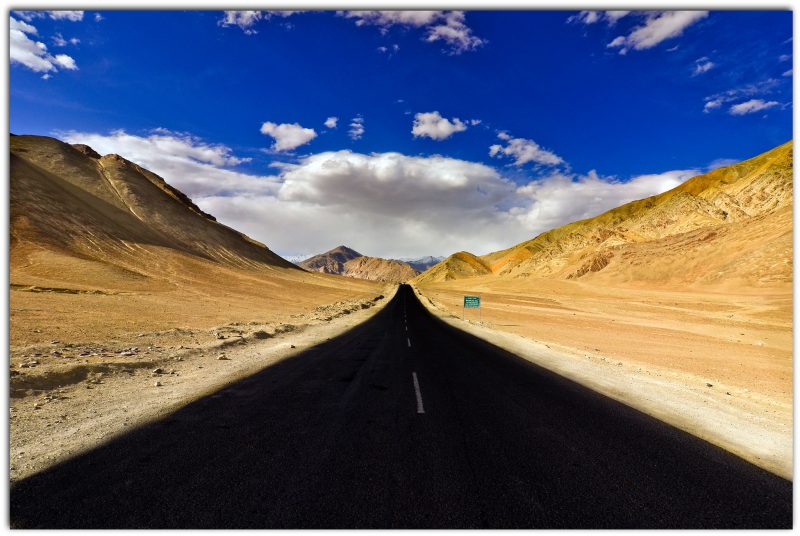
Leh Ladakh in winter
Optical illusion theory behind magnetic hill
The theory states that this magnetic field is an optical illusion caused by the descending and rising terrain. The alignment of the road and the absence of a visible horizon create a downward slope to appear like an upslope.
The second theory behind this hill states that it excuses a strong magnetic force that pulls vehicles parked within its range. Tourists and Air Force officials have agreed with this theory.
This hill is 30km away from the town of Let on the Leh-Kargil highway, at an elevation of around 14,000 feet above.
Zanskar Valley: It is located in the Kargil district to the east of Ladakh around 105 km. it is pronounced as Zahar locally, it is a part of the Zanskar mountain range which is a part of the Himalayas. Zanskar Valley is also the hub of wild animals like wolves, leopards, bears, and marmots.
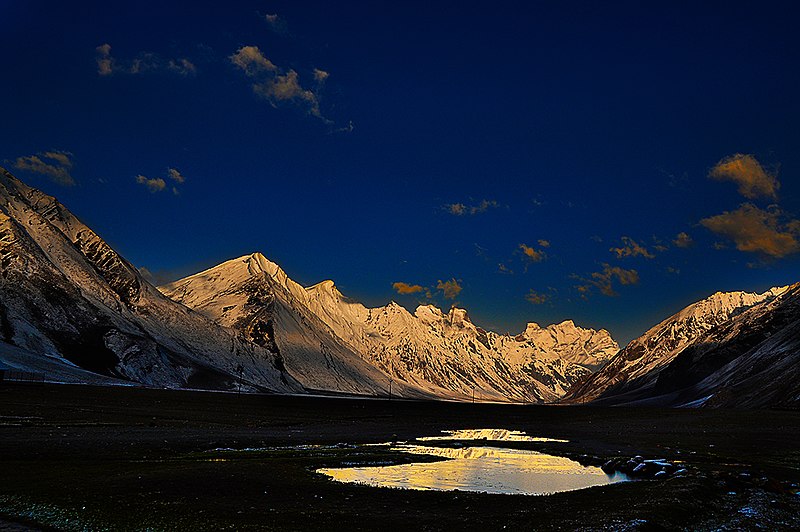
Zanskar Valley
This place used to be cut off from the rest Of the world for over 9 months of the year because of very heavy snowfall in the region. The best month to visit Zanskar is during the summer days from June to September. The region is accessible by road only up to October.
It is easy to reach Zanskar by road, railways, and airways as well. The airport is 60km away from the main place, with the name of Bakuls Rimpochee Airport.
Sangam: Sangam is the confluence of the Indus and Zanskar Rivers nestled between the soul-soothing mountains of the cold desert. It is situated 35km from Leh in near the village of Nimmu, on the Leh to Srinagar Highway.
It is a very spectacular Sangam as the Indus River can be seen as shiny blue while the Zanskar River is dirty green. Be it the summer or the winter season, the confluence of these two magnificent rivers is not a sight to be missed on a Ladakh trip. It is a remarkable depiction of nature’s magical nuances.
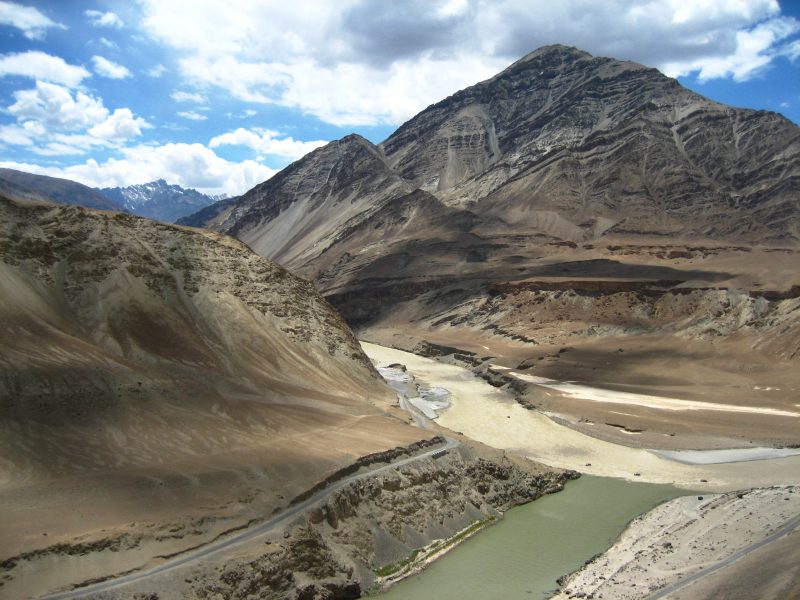
Sangam of Leh ladakh
There are no local buses to visit Sangam, you can board a bus traveling to Srinagar and get down at Sangam. Because of the high altitude, acute mountain sickness is common here.
Shanti stupa: It is a Buddhist white-domed stupa(chorten) on a hilltop in Chanspa, Leh district, In north India. It was built in 1991 by the Japanese Buddhist Bhikshu Pagoda mission. It holds relics of the Buddha at its base, enshrined by the 14th Dalai Lama. This place is a tourist attraction not only because of its cosmic beauty but due to its panoramic views of the surrounding landscape.
It is situated at a height of 3,609 meters, 5km away from Leh. it can be reached by a drivable road or on foot using a series of 500 steep steps to the hilltop.
Festivals in Leh-Ladakh
Ladakh is the home of a plethora of mesmerizing and colorful festivals, which are mainly volunteered by monks and locals alike. These festivals are observed by the indigenous people according to the Buddhist calendar. Hemis festival is one of the festivals that every visitor should attend to learn about the rich culture of this region. It is one of the most well-known activities to do in Let, as well as photogenic.
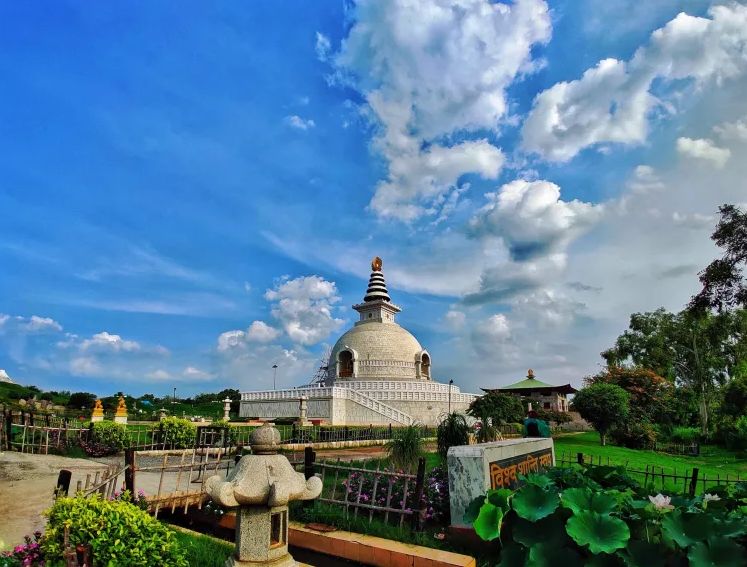
Leh Ladakh in Winter
Best time to visit Leh-ladakh
April to June
April is the exact month when the tourist season begins. In summer most of the lakes are accessible and you can enjoy them without the limitation of weather. In this period Leh has beautiful clear blue skies but do remember you need to wear layers of 50+ SPF sunscreen because the sun here in this season can carve out brand new noses for travelers if they forget to wear strong sunscreen. Apart from that some layers of clothes will be required as the weather will be cold at night.
Check out nightwear for the Leh-Ladakh trip on Kosha
In April Leh possesses different kinds of frozen beauty in the form of snow-capped mountains and lakes. It provides freshness to the visitors as it was a recovery period for Leh from the freezing winters.
July to August:
This month is monsoon month i.e. late July till the end of August sometimes
experience landslides and bursting of clouds. So, in this month visitors can experience the rain striking the mountains that scatters the smell of soil in nature. But due to the cloud bursting and landslides, it is dangerous to travel in this season. Numerous roads and ways also get blocked and closed because of various slides and natural calamities.
September and October
It is the season of chill sets in Leh but the sun keeps shining and maintains the aesthetic beauty of mountains and valleys. This time is great for the trekking people. But make sure that you should carry your trekking kit or everything required for trekking.
November to February: It is not preferable to travel to Leh in the winter because of the extreme weather. With the exception that trekkers like to visit this place for the Kahltsey(sham)trek, but for November only, after that all trekking routes close down after November.
The most famous Chadar trek is best conducted between January and mid-March.
Essential things required for Trek in Leh-Ladakh in heavy winters
Essentials to pack for Leh-Ladakh
Clothes: The answer to the most asked question, is what to pack for the Leh Ladakh trip because it has highly unpredictable weather conditions. Hence, rather than stuffing your luggage with only woolen clothes try to pack some cotton T-shirts, thermals, light woolen and waterproof jackets.
Accessories: To enjoy a smooth trip to Leh-Ladakh you need to pack a lot of accessories.
Sunscreen lotion: The flaming heat of Ladakh will surely make your skin tanned. So to prevent it from harsh sunlight, carry sunscreen that has the highest SPF.
Sunglasses: Eyes also need to be protected after skin. The UV rays of the sunlight at high altitudes tend to pose a negative effect on the eyes. Hence, you should carry sunglasses that will be comfortable during the journey.
Gloves: Though woolen gloves will also provide you with protection, it is recommended to keep waterproof gloves with you on your trip to Leh-Ladakh.
Documents: You should keep at least one government identity card like an Aadhar card, passport, Driver’s license, or voter ID with you. Make sure that you are carrying the original as well as a photocopy of the identity document that you are carrying.
Apart from this, there are certain documents that you must carry on a trip including a printout of the COVID-19 vaccination certificate, a copy of flight tickets, a hotel reservation slip, and a passport-size photograph.
Miscellaneous: If you are not used to high mountains or altitude sickness issues then must carry some medicines to avoid health issues during the trip. Apart from that you can also carry some eatables & extra water bottles.
How to reach Leh-Ladakh
By Air
Airway is one of the best ways from Delhi to enjoy a spectacular flight in India with stunning aerial views of the snow-capped peaks as you fly over the Himalayan mountains. The Ladakh airport’s name is Bakula Rimpochee Airport just located 4 km from Leh city center.
There are around 8 flights per day in each direction between Delhi and Leh. In the winter season, roads are not accessible because of blockage and snowfall, in that case, flights are considered as the best option to reach without any hurdle.
By Road
There are incredibly scenic routes when taking a trip from Delhi to Leh-Ladakh by road. One route is from Manali and the other leads you through the astounding beautiful Srinagar.
Adventurous roads and backdrops are the common factors in both these routes. Yet, each route has its unique scene and experiences. With enticing stopovers and countless spots to capture mind-blowing photos, a Delhi to Ladakh road trip assures excitement and fun in equal measures.
From Delhi distance is around 101 km (approx.). Starting from Dekhi, your way will go through Karnal, Mandi, Manali, Jispa(through Rohtang Pass), Sarchu, Tanglang La, and then reach your destination, Leh, which will take you around 24 hours without any detours.
By train:
You cannot reach Ladakh directly by train; there is no train station in Ladakh. The nearest railway station is Jammu Jammu Tawi(700km from Ladakh) which is well-connected with Delhi, Kolkata, and Mumbai. You can hire a cab or board a JKSRTC bus to reach Ladakh from Jammu.
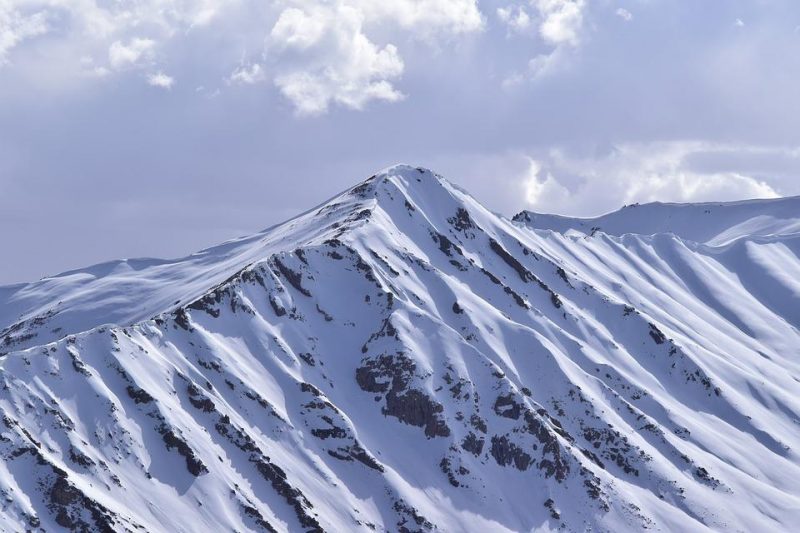
Mountains of Leh Ladakh
Where to stay in Ladakh:
Hostels: There are a wide variety of hostels with numerous offers. If you are going on a group trip, hostels can be the best option to enjoy at the utmost level. It will provide you with an engaging environment. It is also the best way to meet new people of some age groups. The hostel is budget-friendly with proper facilities.
Hotels: There is a wide variety of hotels available in Leh-Ladakh in different locations according to the budget that provides mountainous views. There are different types of hotels with various specifications according to your requirements you can choose a/c for your chosen location.
Basic service availability in Leh-Ladakh
With the rise in tourism to Leh-Ladakh, the number of vehicles that reach Leh-Ladakh also increased which brings the importance of the availability of Petrol and other Fuel availability in Leh-Ladakh.
Fuel services :
Ladakh is a remote place with numerous desolate routes in Ladakh. The one thing that one should take care of while going on a road trip within Leh-Ladakh is that petrol or diesel is available only in Leh town (2 petrol pumps are in/around Leh) and one petrol pump is present in Karu town which is about 34 km from Leh on Manali- Leh Highway.
There is one petrol pump in Diskit, Nubra Valley town that also works in winter. Petrol availability in Leh has tremendously improved as well now for the last few years.
The biggest problem is that most of the tourist destinations in Ladakh are not near Leh rather about 150 km away from Leh and the return journey makes it around 300kms. So You cannot travel on circuits like Leh- Nubra Valley-Pangong Tso-leh or Leh-Pangong Tso, without the spare fuel.
Bank facilities in Leh Ladakh:
Can I expect to find an ATM/Bank in Ladakh? Is there any ATM in Ladakh? Availability of banks and ATMs in Ladakh.
To answer these questions, yes there are banks in Ladakh but not in all places. The presence of ATMs is strictly limited and you cannot use plastic money in a lot of places. Except Leh, most of your trip will be dependent on cash transactions, including Manali -Leh, and Srinagar -Leh highways. So, better to carry cash as your backup because you really can’t rely on online payments and plastic money.
Network facilities in Leh Ladakh
If we talk about the main area of Leh and neighboring towns, network coverage is good, you can get full 4G coverage with high-speed internet and a calling facility. But the important thing is to take care that postpaid mobile networks are the ones that work properly in Ladakh and the Jammu Kashmir region as well.
BSNL by far is the best mobile network in Ladakh with the widest coverage, Airtel is considered as the second-best closely followed by Jio at Third.
In most places, you will have less or minimum connectivity whereas in some places like Sham Valley, and Zanskar Valley are some places where there is no connectivity at all.
Budget for Leh Ladakh Trip
The answer to this question solely depends on the number of days you have planned to stay over there. Secondly, the budget trip including Leh-Ladakh mainly varies from person to person and the comfort of stay that you prefer.
On a Ladakh trip, you can stay in dhabas that cost Rs 125, hostels cost 300-400, or posh hotels ranging from 3000-15000. The same goes with food you can also settle with local dhabas or tea shacks or can opt for lavish costly restaurants.
No people, mode of transportation, and days to stay you are planning are some of the key factors that will affect the cost of your trip. So, make a budget for your trip and try to figure out whether you are planning for a lavish trip or a cost-cutting trip. Then start planning about the accommodation, food, and everything accordingly.
Conclusion
Ladakh is a place rich in culture, monasteries, and a soul-purifying place for the meditators. Leh-Ladakh is a destination for historians, nature lovers, bibliophiles, adventure lovers, silence lovers, and everyone else because the beauty that Leh-Ladakh possesses is unbelievable.
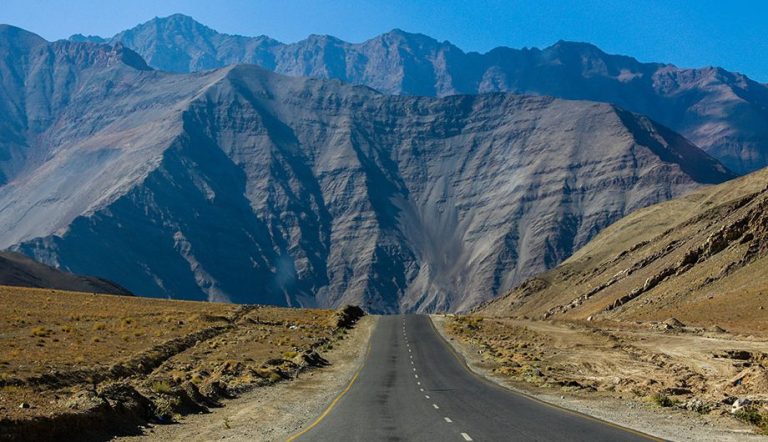
Road trips of Leh Ladakh
It is one of the top places for bikers & road-trip lovers. The Peaceful, implausible beauty of mountains and rivers dispenses a different kind of positive energy to the tourists and makes them fall in love with the place.
FAQ’S
Is Ladakh safe?
Visitors are mainly afraid of this place because of the weather, high altitude, and political problems in Kashmir Valley. But the truth is that the region is extremely safe for tourists. Kashmir sees cross-border attacks and incursion, but none of it is anywhere close to Leh-Ladakh. Even Chinese instructions are only common in villages that are adjacent to the border.
The turmoil in Kashmir is only centered around Srinagar, and if you want to be extremely safe, you can avoid taking the Srinagar Leh highway. Kargil is also free of any political turmoil, so apart from that it is assured that you will not be caught in the middle of any unrest in the valley.
If you talk about the harsh weather conditions, rough terrain, winding roads, and the problem of high altitude. It is not hidden that these problems exist in Ladakh, but there are precautions that you need to take before you plan your journey. So, you need to carry medicines with you all the time, take rest every few hours, and stay hydrated.
Do I need medical clearance to trek in Ladakh?
Yes, it is mandatory to undergo a medical checkup at Leh before taking the Chadar trek. If you are going without medical clearance, you will not receive ALOTA (All Ladakh Tour Operators Association) clearance and permission from the Wildlife Department to undertake the trek. Also, you will need 3 days to acclimate to the reduced oxygen level before taking the trek.
The Deputy Commissioner, Leh Avny Lavasa in an order issued made it mandatory for all the tour operators including ALTOA, and visitors to undergo the medical examination on the 3rd day of arrival.
Hence it is advised by the Senior authorities to the operators to inform their visitors that they should plan their trip accordingly and that they have to undergo the medical test on the 3rd day. Without this Chadder trek is not allowed.
For foreign trek it is mandatory to carry their health certificate that will be duly checked at the wildlife post at chilling, without tourists will not be allowed to start trekking and visit places.
When does it snow in Ladakh?
In Leh-Ladakh winter season starts in late October and lasts till February, with the temperature dropping as low as 10 degrees Celsius. January and February are the extremely cold months in Ladakh.
From mid-June, you can snow in Ladakh not only in the mountains but also on the side of passes. The best time to visit Leh-Ladakh is from April to July during this time the temperature varies from 15 to 30 degrees Celsius.

